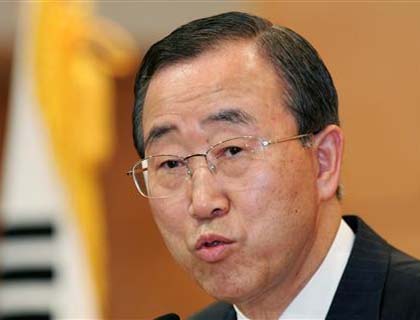KIEV – The nuclear disasters at Chernobyl and Japan's Fukushima have shown the need for a "global re-think" on nuclear energy, U.N. General Secretary Ban Ki-moon said on Tuesday.
Ban said the 1986 disaster in Ukraine and the threat to the Fukushima nuclear plant following an earthquake and tsunami this year demonstrated that "nuclear accidents respect no borders."
"How can we ensure the peaceful use of nuclear energy and maximum safety? We need a global re-think on this fundamental question," he told an international conference in the Ukrainian capital Kiev marking 25 years since the world's worst nuclear accident.
Ban called for a "top-to-bottom" review of nuclear safety regulations and urged states to apply high standards of safety precautions, allow independent oversight at plants and be more transparent to secure public confidence.
"Nuclear power plants must be built to withstand everything from earthquakes to tsunamis, from fires to floods," he said, with the Fukushima crisis clearly in mind.
He called for efforts to strengthen the work of the International Atomic Energy Agency (IAEA) and use its capacity for sharing expertise and know-how on nuclear safety issues.
Ban endorsed the IAEA's convening of a ministerial conference on nuclear safety in June to draw lessons from Fukushima.
In Vienna, a senior IAEA official said there were already intense preparations for the conference. "I don't know if you can call that 'global re-thinking' but I think there will be a lot of thinking at this June conference so that nuclear energy is safer," Denis Flory told a news conference.
He said the IAEA was planning to send a team of international experts to Japan on a fact-finding mission that would report back to the conference. The team would also suggest ways to improve the overall situation at the plant.
Flory said the aim of the June conference was to strengthen the global nuclear safety framework. The IAEA, with 151 member nations, lacks the power to enforce safety standards it recommends.
Some diplomats have voiced concerns that countries seeking to start their first nuclear power programs might be loath to sign up to stricter rules. (Reuters)

